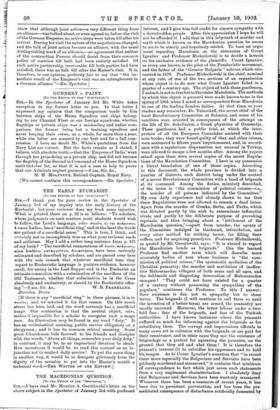THE EARLY EUCHARIST.
[TO THE EDITOR OF THE "SPECTATOR.")
thank you for your review in the Spectator of January 3rd of my inquiry into the early history of the Eucharist; but your reviewer does my book some injustice. What is printed there on p. 32 is as follows : " To scholars, whose judgments on such matters most students would wish to follow, the Lord's language, TO-67 0 arorasE, di; -csly icrciicionary, xectri Beethiee, has a' sacrificial ring,' and at the least the words are patient of a sacrificial sense." This is true, I think, and certainly not so incompletely true as what your reviewer reads and criticises. May I add a rather long sentence from p. 105 of my book? "The sacrificial connotations of lroisiv, circitcrnag, aliha bradironc, zerretyybaur, haucovipror, have been variously estimated and described by scholars, and are passed over here with the sole remark that whatever sacrificial tone they impart to Eucharistic language is positive evidence, however mall, for seeing in the Last Supper and in the Eucharist an intimate connection with a culmination of the sacrifices of the Old Testament, whether that culmination be in the Cross absolutely and exclusively, or shared by the Eucharistic offer- [If there is any " sacrificial ring" in these phrases, it is in venire ; and we selected it for that reason. On this much stress has been laid, and the word certainly has a sacrificial usage. Our contention is that the neutral object, TODTO, makes it impossible for a scholar to recognise such a usage here. An illustration may be found in our word " duty." It has an ecclesiastical meaning, public service obligatory on a clergyman ; and it has its common ethical meaning. Some great Churchman bids farewell to his friends and disciples with the words, "Above all things, remember your daily duty," in contrast, it may be, to an impractical devotion to ideals. How monstrous it would be to read this counsel as an in- junction not to neglect daily service ! To put the same thing in another way, it would be to derogate grievously from the dignity of the occasion to put into the Master's mouth a technical word.—Tne WRITER OF THE REVIEW.]






































 Previous page
Previous page